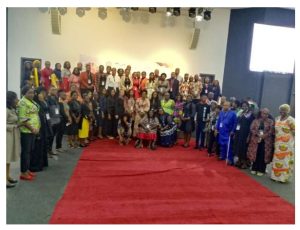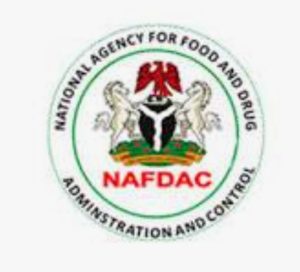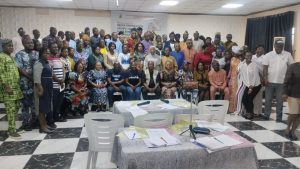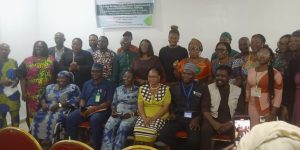NPSIA review activity held in Benin, stakeholders harp on importance of vaccinination
7 min read
NPSIA review activity held in Benin, stakeholders harp on importance of vaccinination
By Bernadette Idalu
Members of the Media and women led Civil Society Organizations (CSOs), with keen interest on societal and family health, on Friday, November 15, 2024, congregated at the Vichigates Hotel and Suits, Benin City, where they networked, and came up with possible approaches to boost awareness and use of vaccines in society, to wade off preventable diseases during a one day review of Non-Polio supplemental immunization activities (NPSIA) to improve vaccine trust and uptake in Edo State, organized by Edo State Ministry of Communication and Orientation in collaboration with the United Nations Children’s Fund (UNICEF).

Haven been warmly welcomed by the Permanent Secretary of the Ministry, Mr. Desmond Agbama, and the Director, Mrs. Rose Imonikhe, participants got to work with the review which was all inclusive.
Stakeholders shared and listened to divergent perspectives in an inalienable effort to boost immunization output, just as the helpline: 08033437714 got released to them for feedback and public use to enable concerned citizens report lapses, send in advice or make commendations about vaccination procedures as deemed appropriate from state to primary healthcare, PHC, level, to the listening ears of government.
Though there was a general consensus that vaccinations are predominantly meant to be free, haven been supplied free from donor agencies, some well structured hospitals it was observed, charged a handsome fee while some health practitioners in some public health facilities charged a token for discharging this duty. This brought up the need for supervision by superiors for diligent discharge of duties. Also mentioned was the need to curtail transferred aggression issues while at the field of duty, especially during this trying economic period.
Participants were unanimous in their view that immunisation is one of the best way to prevent disease and protect child’s health though millions of children still miss out on vital immunization doses, especially during supplemental immunization due to ignorance or possible prior exposure to severe adverse events associated with vaccination which caused a high temperature or restlessness of child(ren) hence the resolve to stay away. Such persons were to be informed that adverse reactions last for 48hours whereas the vaccination strengthens public health effort by building up herd immunity.
Thus, the Non- Polio review activity was ground to tackle identified lapses which hinder public participation, critique methodology and procedures of health practitioners to ensure compliance, examine generated vaccination data as against real time practices based on shared experiences in order to verify accuracy of turned in vaccination records.
The gathering provided a window to ventilate about suppressed but nagging experiences of some participants at the hands of health practitioners, a microcosm of the macrocosm of society, along the cause of getting children vaccinated or as adults who have a need to get screened or immunized against the Human Papilloma Virus (HPV), the disease pathogen that causes cervical cancer in females.
It must be realized that “Cervical cancer is the second most common cancer in women in Nigeria after breast cancer. It is also the most common gynaecological (or female reproductive) cancer in Nigeria.
There are over 14,000 new cases and over 8,000 deaths due to cervical cancer occurring annually in Nigeria, making it the second most common cause of cancer deaths in Nigerian women.
However, more than half of women diagnosed with cervical cancer in Nigeria die making it the most deadly cancer in Nigerian women. This high mortality is mostly driven by late diagnosis at which time it cannot be cured.”
As participants paddled through divergent ideas to reach the steadfast commitment of helping to educate, enlighten, and engage with the populace to open their eyes to the benefits of vaccination and immunization, a feedback process which can alter the mortality rate of the next generation if adhered to, however, the morbid fear which keeps people away from vaccination it was discovered did not necessarily have to do with vaccination itself, but its processes, as people from an analysis were more at home receiving doses of vaccination droplets directed at the mouth as opposed to receiving injectables to body parts which they feared might lead to lethal consequences or even paralysis when administered by wrong hands.
As alliances got firmed, a fire ignited in the hearts of participants to be part of a process which gives meaning to the Sustainable Development, SDG, goal, number 3, which harps on “Good health and well-being,” of all.

A “Measles consultant,” Dr. Icomiare Adebudo of the African Field Epidemiology Network, AFENET, in his goodwill message, called on people to embrace vaccination to drive out under five (5) years mortality, which he opined to be needless death. Same thought applied to polio cases and all vaccine preventable diseases. He suggested, “Every child should be reached; government is not out to kill children. What will government gain from doing this? We are all parents. If children are vaccinated and they develop immunity against measles, it means we have already eradicated measles. Rejection of the process will make such people harbour the virus. Until every child is reached, we are only pouring water into the basket.”
The technical session which allowed the interface with exerting but labile health professionals brought participants up to speed with immunization campaigns and candid results. Edo State Immunization Officer, SIO, Omogun Enogie Elfrida, gave an overview of the state routine immunization and NPSIA coverage, noting that the HPV MAC (Human Papillomavirus Multi-Age Cohort,) a vaccination campaign that targets girls aged 9 to 14 years, to give protection against cervical cancer had already kicked off with the introduction and routine campaign in the state on May 27, 2024.
Debunking rumours of it being a killer injection, the SIO stated that the HPV MAC campaign outcome recorded an 88% total vaccination with a 12% ratio left of unvaccinated persons in the state. However, the integrated measles campaign which started by October, she pointed out, used strategies targeting zero reach outreach. This method deployed use of immunization registers or trackers such as the fixed post session, outreach session (tracking those for vaccination within 6Km radius, while Mobile sessions involve those within 10km radius.) She also revealed that they have carried out the PENTA3 Vaccination for Q1, Q2 and Q3 in the 18 Local Government Areas of Edo state. A graphic representation detailed the impact of this intervention.
Delivering the health talk, “Barriers to vaccine trust and uptake in the state: Lessons from the NPSIAs,” from Edo State Primary Healthcare Development Agency, Mr. Aideyan Gabriel highlighted a series of attitudinal barriers, level of literacy and ignorance, inability to persuade individuals respectfully to accept vaccination, preference for oral vaccines as against injectable vaccines as strong factors which hindered vaccination processes.
The United Nations Children’s Fund,
UNICEF, a partner organization, that works to promote the rights of children in Nigeria and Edo State through interventions that prevent burdens associated with the spread of diseases among children to enable them reach their full potentials had two consultants at hand to address pressing issues. Mac- Fisi Kenneth, a Social and Behavioral Change, SBC, expert in his paper, “Moving beyond barriers to reach every child: The role of the Media and CSOs” listed barriers to immunization to include physical, sociocultural, economic, political and governance barriers. He mapped out the roles of the media in immunization processes to include raising awareness and benefits associated with immunization; dispelling myths and misinformation by providing science, accurate based facts and addressing concerns which lead to vaccine hesitancy; mobilizing communities through the media space as well as giving reminders on vaccination dates and helping to foster trust in vaccination through positive messages from the media, health professionals, community leaders and influencers.
The spelt out the role of the CSOs to include community mobilization, logistical support, advocacy and policy influence and building community trust. Nonetheless, the collaboration between the Media and CSO, he said, would strengthen outreach, make for joint campaigns with far reaching output delivery; allows a two way communication which allows communities ask questions which can be directed and addressed by the media and CSOs in real time to build transparency and trust in vaccination programmes. Also, is the issue of crises management where both organizations prevent crises through fast and accurate dissemination of information and guidance on how to address public concerns.
On her part, Aderonke Akinola-Akinwole, another SBC specialist, in her presentation, “Debunking and Demystifying myths and misconceptions” said such stories had to do with an incorrect opinion based on false information or misunderstanding of a concept. She touched on results of misconception; effects of misconception; examples of vaccine rumours; how to debunk misconceptions about HPV vaccines; combating some of the rumours with fact checks; impact of dealing with misconception; and, our roles as the life wires of information dissemination wherein she encouraged participants to
provide correct, consistent, and continuous information on the scourge of vaccine-preventable diseases and effectiveness of childhood vaccines.
Attempt she said must be made to influence policymakers through advocacy reporting and human centered storytelling to improve demand for childhood vaccines while educating the public through leveraging on regular channels of interaction with caregivers and stakeholders, providing platforms for technical experts to contribute to conversations around promoted behaviors as well as debunking myths, misconceptions, and misinformation about childhood vaccines.








